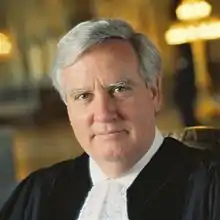Christopher Greenwood
Sir Christopher John Greenwood, GBE CMG QC (* 12. Mai 1955 in Wellingborough) ist ein britischer Jurist und Professor für Völkerrecht an der London School of Economics and Political Science. Am 6. November 2008 wurde er für neun Jahre zum Richter am Internationalen Gerichtshof (IGH) in Den Haag gewählt.[1][2]

Leben
Greenwood besuchte die Wellingborough School in Wellingborough und studierte anschließend Rechtswissenschaften am Magdalene College der University of Cambridge wo er 1976 seinen Bachelor absolvierte, 1977 einen Bachelor of Laws im Völkerrecht und 1980 einen Mastertitel erwarb.
Von 1981 bis 1996 war er als Dozent an der University of Cambridge tätig und wurde anschließend zum Professor für Völkerrecht an der London School of Economics and Political Science ernannt.
Seit 1985 ist er als Barrister tätig. 1999 wurde er zum Kronanwalt ernannt und im Juni 2002 in den Order of St. Michael and St. George aufgenommen. Er verfasste 2002 ein umstrittenes Gutachten für Attorney General Goldsmith und die britische Regierung, welches die Irakinvasion rechtfertigte.[3][4]
Greenwood ist zudem Mitherausgeber des British Year Book of International Law, des Year Book of International Humanitarian Law und des Journal of Conflict and Security Law. Er ist Mitglied des British Institute of International and Comparative Law, des Internationalen Instituts für humanitäres Recht und seit 1979 der Amerikanischen Gesellschaft für internationales Recht.
Er vertrat die britische Regierung in zahlreichen Fällen vor internationalen und nationalen Gerichten.
Am 6. November 2008 wurde Greenwood als Nachfolger für Rosalyn Higgins an den Internationalen Gerichtshof berufen. Seine Kandidatur für eine weitere Amtszeit als IGH Richter wurde 2017 nach erfolglosen Wahlrunden in der UN-Generalversammlung zugunsten des indischen Juristen Dalveer Bhandari zurückgezogen.[2]
Werk (Auswahl)
- State responsibility for the decisions of national courts. In: Malgosia Fitzmaurice (Hrsg.): Issues of state responsibility before international judicial institutions, Hart, Oxford 2004, ISBN 1-8411-3389-2, S. 55–73
- Command responsibility and the Hadzihasanović decision. In: Journal of international criminal justice, Bd. 2, 2004, ISSN 1478-1387, S. 598–605
- The legality of the use of force: Iraq in 2003. In: Michael Bothe (Hrsg.): Redefining sovereignty: the use of force after the cold war, Transnational Publ., Ardsley 2005, ISBN 1-571-05324-7, S. 387–415
- Essays on war in international law. Cameron May, London 2006, ISBN 978-1-905017-32-4
Einzelnachweise
- www.icj-cij.org/presscom/files/3/14863.pdf (Memento des Originals vom 7. Juni 2013 im Internet Archive) Info: Der Archivlink wurde automatisch eingesetzt und noch nicht geprüft. Bitte prüfe Original- und Archivlink gemäß Anleitung und entferne dann diesen Hinweis., Stand: 21. November 2008.
- Owen Bowcott Legal affairs correspondent: No British judge on world court for first time in its 71-year history. In: The Guardian. 20. November 2017, ISSN 0261-3077 (theguardian.com [abgerufen am 20. Dezember 2017]).
- Owen Bowcott: War QC sticks to his guns. In: The Guardian. 1. März 2004, ISSN 0261-3077 (theguardian.com [abgerufen am 20. Dezember 2017]).
- The Committee Office, House of Commons: Memorandum by Professor Christopher Greenwood, CMG, QC THE LEGALITY OF USING FORCE AGAINST IRAQ. In: House of Commons - Foreign Affairs - Minutes of Evidence. Abgerufen am 20. Dezember 2017.
Weblinks
- International Court of Justice - Judge Christopher Greenwood Biographie auf der Website des IGH (englisch, mit Bild)
- Biographie mit Bild auf der Seite der Essex Court Chambers (englisch)
- Biographie auf der Seite der LSE (englisch)
- Memorandum von Greenwood über die Rechtmäßigkeit der Anwendung von Gewalt gegenüber dem Irak (Oktober 2002) (englisch)